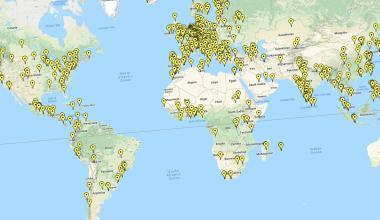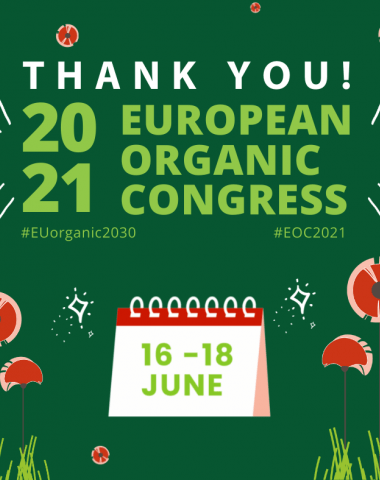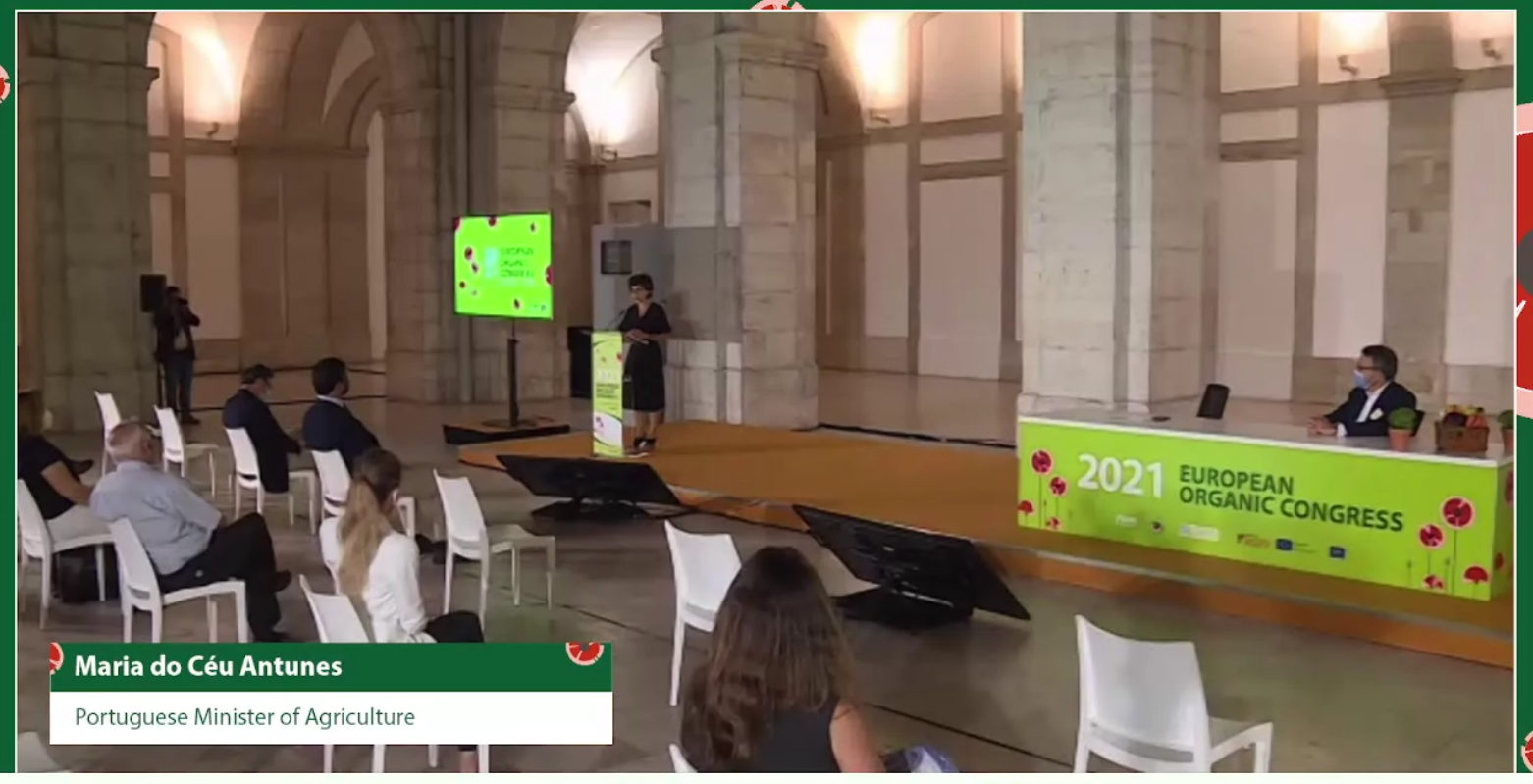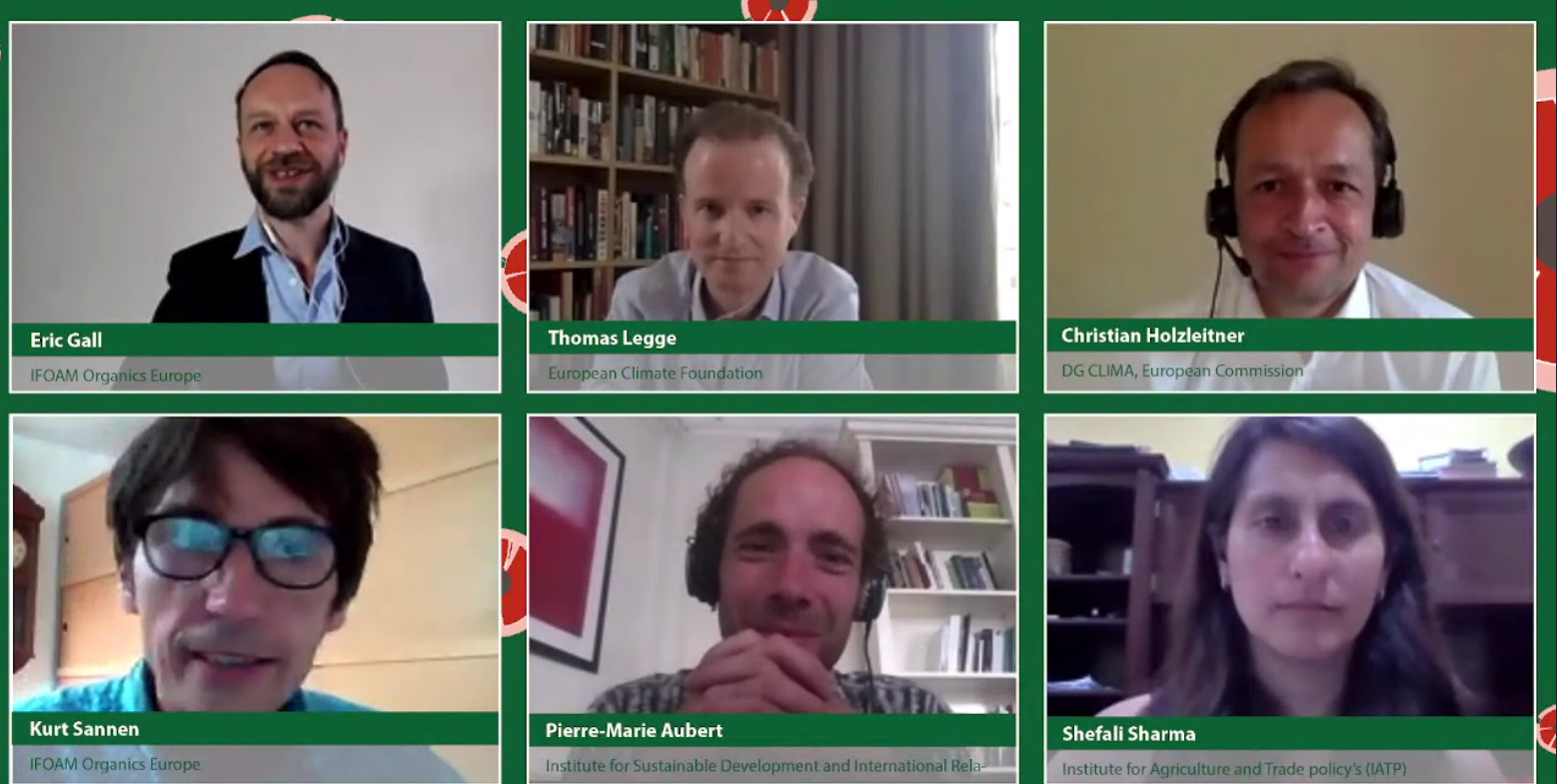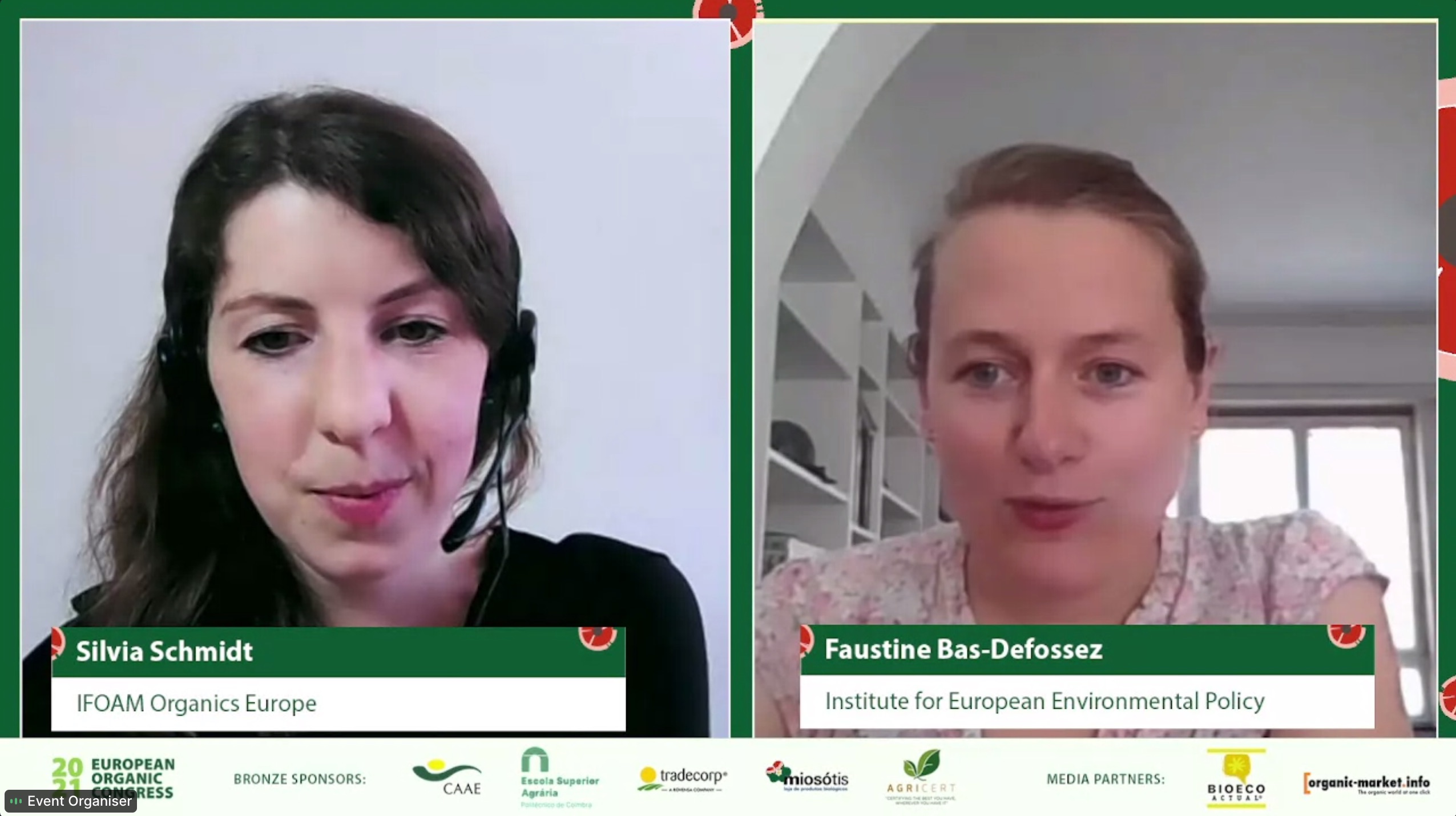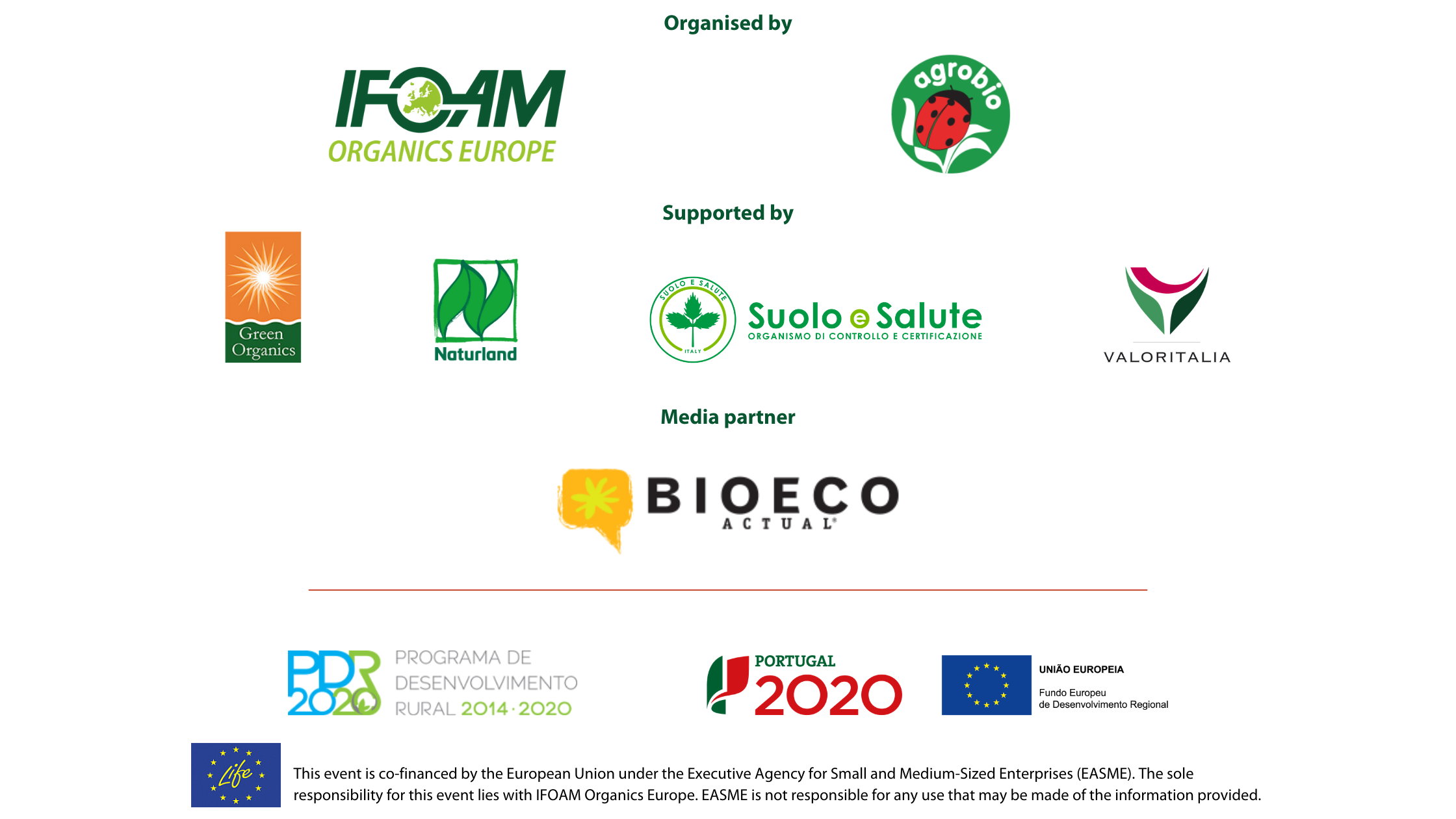More than 660 discussed transitioning to more sustainable food & farming systems at European Organic Congress, 16-18 June, online, live from Lisbon.
This year’s edition of our European Organic Congress took place online and live from Lisbon on 16-18 June 2021. More than 660 participants tuned in to ‘Organics’ contribution to the European Green Deal’, aimed to inspire participants on how the agri-food sector enhances the transition to a more sustainable food system.
Opening: End of the CAP negotiations?
Jan Plagge, President of IFOAM Organics Europe, and Maria do Céu Antunes, Portuguese Minister of Agriculture, welcomed participants on the first day of the three-day-event. Maria do Céu Antunes opened the Congress thanking farmers for their crucial role during the pandemic. Minister do Céu Antunes also reminded the audience and speakers of the priorities of the Portuguese Presidency of the Council of the European Union for agriculture to promote a resilient Europe, especially as the Common Agriculture Policy (CAP) negotiations are coming to an end. She highlighted that organic is part of the solution to reach a more sustainable and balanced food and farming system, stating policymakers need to ensure its support by boosting both organic production and consumption.
Link CAP to EU Farm to Fork & Biodiversity strategies & involve movement nationally
IFOAM Organics Europe’s Director Eduardo Cuoco kicked off the first panel assessing whether CAP and CAP strategic plans are in line with the EU Green Deal objectives, especially the 25% organic land proposed in the EU Farm to Fork Strategy. Bruno Dimas, Deputy Director-General for Planning and Policy at the Portuguese Ministry of Agriculture, stated the CAP reform could be sealed by the end of the month. Tassos Haniotis, Director for Strategy, Simplification and Policy Analysis at the Directorate General for Agriculture and Rural Development of the European Commission, assured the Commission was very involved in the negotiations and drafting the CAP proposal, acknowledging previous versions of the CAPs lacked environmental ambition.
Celia Nyssens, Policy Officer for Agriculture at the European Environmental Bureau, Aina Calafat Rogers, Deputy Council member of IFOAM Organics Europe and Jan Plagge emphasized the necessity to stop business as usual, quit the current status quo in strategic plans and finally give public money to public goods. They called for the CAP co-legislators to ensure the CAP Strategic Plans Regulation mentions the need for Member States to develop and adequately support organic farming – which the Commission identified as part of the solution to reach the Green Deal’s ambitious environmental targets. A poll among the congress’ attendees found that most audience members were unsatisfied with their own involvement in the national consultation process on the CAP strategic plans.
On the ground: Organic farming in Portugal
The afternoon session was dedicated to organic farming in Portugal, addressing the main challenges organic conversion entails when it comes to achieving the 25% organic land target by 2030 as well as the relationship between organic farming and public health. Jaime Carvalho Ferreira, Chairman of the Board at AGROBIO, welcomed participants and moderated the panel discussion. Gonçalo de Freitas Leal, Director, Portuguese Directorate-General for Agriculture & Rural Development, gave an overview of the organic situation in Portugal and presented the Portuguese national strategy for organic production which entered into force in 2017.
Fátima Ferreira, Maternal Health & Midwifery Nurse with a master’s degree in organic farming, elaborated on organic as a potential public health indicator, based on scientific evidence showing that pesticides are endocrine disruptors linked to several illnesses and diseases. The panel also touched on the challenges met when transitioning to organic and projects helping further develop organic and climate-friendly practices in agriculture.
Tackling climate & biodiversity crisis requires a systemic approach
The second day started with a session on ‘Climate mitigation and sequestration in agriculture: What is the right level of ambition?’, moderated by Eric Gall, Deputy Director and Policy Manager at IFOAM Organics Europe. During his opening speech, Christian Holzleitner, Head of Unit for Land Use and Finance for Innovation at the Directorate-General for Climate Action at the European Commission, presented the Commission’s ‘Fit for 55’ legislative package to overhaul the EU climate policy architecture as well as the carbon farming initiative.
Joined by Pierre-Marie Aubert, Senior Researcher and Coordinator of the European Agriculture Initiative at IDDRI, Thomas Legge, Land Use Director at the European Climate Foundation, Kurt Sannen, Chair of Interest Group of Organic Farmers (IGOF) at IFOAM Organics Europe and Shefali Sharma, Director at Institute for Agriculture and Trade policy’s (IATP) European office, all panellists agreed on the necessity to have a systemic approach to tackle the climate and biodiversity crises jointly.
However, Thomas Legge warned participants to remain cautious about the potential of carbon sequestration in agricultural soil as carbon sequestration in farming cannot be used as offsets in other sectors. Focusing on policy levers, Shefali Sharma and Kurt Sannen pleaded for political support for practices mitigating climate change, more specifically for CAP strategic plans to support organic conversion and nature-based solutions removing carbon from the atmosphere and helping the EU achieve climate neutrality.
Sustainable food systems require true cost of food
The second session of the day moderated by Silvia Schmidt, Food Policy Officer at IFOAM Organics Europe, focused on sustainable food systems. In a video message, Greens/EFA MEP Claude Gruffat said the holistic approach offered by the EU Farm to Fork strategy calls for practical change in both farming production methods and consumption. Though, to reach 25% of organic land by 2030, he believes we will need much greater budgetary resources as today organic covers 8.5% of EU land but only receives 1.8% of the CAP budget.
Nathalie Chaze, Director for Food sustainability and International Relations at the Directorate-General for Health and Food Safety at the European Commission, asserted sustainable public procurement will be a powerful tool to promote consumption of healthier and more sustainable food products, as part of a legislative proposal expected in 2023. Both her and Dora Drexler, Board Vice-President of IFOAM Organics Europe agreed the Organic Action Plan was a milestone document.
For the European organic movement, the 25% organic target is ambitious but achievable with right policies measures and other initiatives in place and the new organic action plan indeed includes several actions that may greatly contribute to achieving this target, if the actions are adequately followed up on, at all relevant levels. During her intervention, Faustine Bas-Defossez, External Impact Director at the Institute for European Environmental Policy, highlighted for instance some needed CAP-related actions to rebalance support to food and help implement the EU Green Deal’s objectives. Wrapping up, Tobias Bandel, Managing Director of Soil & More Impacts, reminded the audience that sustainability is about the ability to sustain, and companies can already play their part by internalizing as much as possible the externalities though true cost accounting tools.
EU Organic Regulation: Harmonization & local adaptation
Of course, the European Organic Congress is not complete without a session on the new Organic Regulation. IFOAM Organics Europe’s Regulation Manager, Emanuele Busacca, moderated the first session on the last day. Elena Panichi, Head of the Organics Unit at the European Commission, informed participants on the development of the secondary legislation, gave an overview of the published acts and next steps from now until January 2022 and beyond.
Marian Blom, Board Vice-President of IFOAM Organics Europe, and Michel Reynaud, Board member and sector representative for certification of IFOAM Organics Europe, explained the expected changes for producers, processors and traders and described the expected ones on controls, certification and international trade.
One of the take-aways from this session is that a balance between harmonization at EU level and local adaptation at regional level will be crucial for a successful implementation of the regulation. All panellists also agreed that a constructive dialogue and continuous communication between the Commission and the stakeholders will be key elements in the implementation of the New EU Organic Regulation. Did you know IFOAM Organics Europe is drafting guidelines for the new Organic Regulation to guide our members and organic stakeholders? Stay tuned for more information in the coming weeks.
A long-term vision for rural development & biodistricts’ potential
This year’s European Organic Congress ended with a session on rural development and a European long-term vision for rural areas led by Eva Berckmans, Communications Manager at IFOAM Organics Europe. They informed participants that, as European organic movement, we contributed to the Commission’s stakeholder consultation, reiterating that organic businesses stimulate rural development by employing more people than conventional farms and providing ecosystem services like better health of soil, plants, animals and humans.
After a video presentation of Froidefontaine Farm, a good example of rural development, by its founder, Alexis de Liedekerke, a high-level panel composed by Silvia Michelini, Director for Rural Development at the Directorate-General for Agriculture and Rural Development at the European Commission, Doris Letina, Vice-President at European Council of Young Farmers, Luis Saldanha, Chairman of the Board at National Young Farmers Confederation (CNJ) and Salvatore Basile, President of the International Network of Eco Regions, further discussed the Commission’s long-term vision for rural areas. They explored initiatives such as organic districts (or biodistricts), living labs and lighthouses farms potential to contribute to the development and attractiveness of rural area, as well as the success of the Organic Action Plan and 25% organic land target by 2030.
Organic farmers are leaders of sustainable agriculture of the future
We were delighted to have Janusz Wojciechowski, Commissioner for Agriculture and Rural Development at the European Commission, close this year's edition of our European Organic Congress together with our President Jan Plagge. The Commissioner said “organic farmers are the leaders of the sustainable agriculture of the future. We have to aim for an agriculture that combines best practices for biodiversity, climate mitigation and high animal welfare standards”. He also called on us to keep on sharing best practices, lead by example and motivate Member States to develop organic farming.
Relive the congress by going through our Twitter Moment, browsing #EOC2021, and watching the congress recording.
We would like to thank our speakers, participants, technical consultants, co-organisers, sponsors, supporters, and media partners for making this congress possible.
